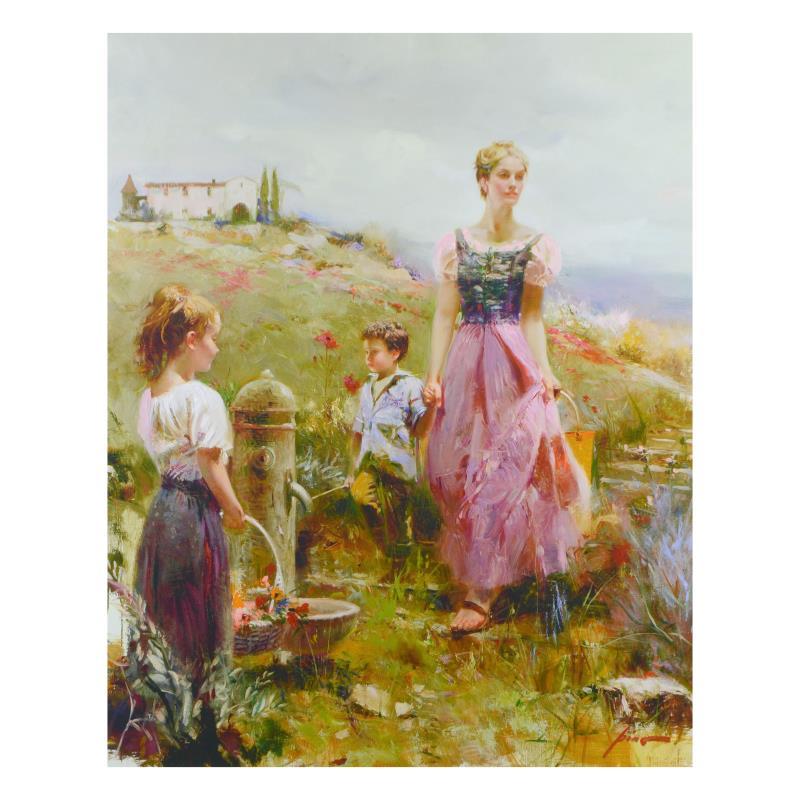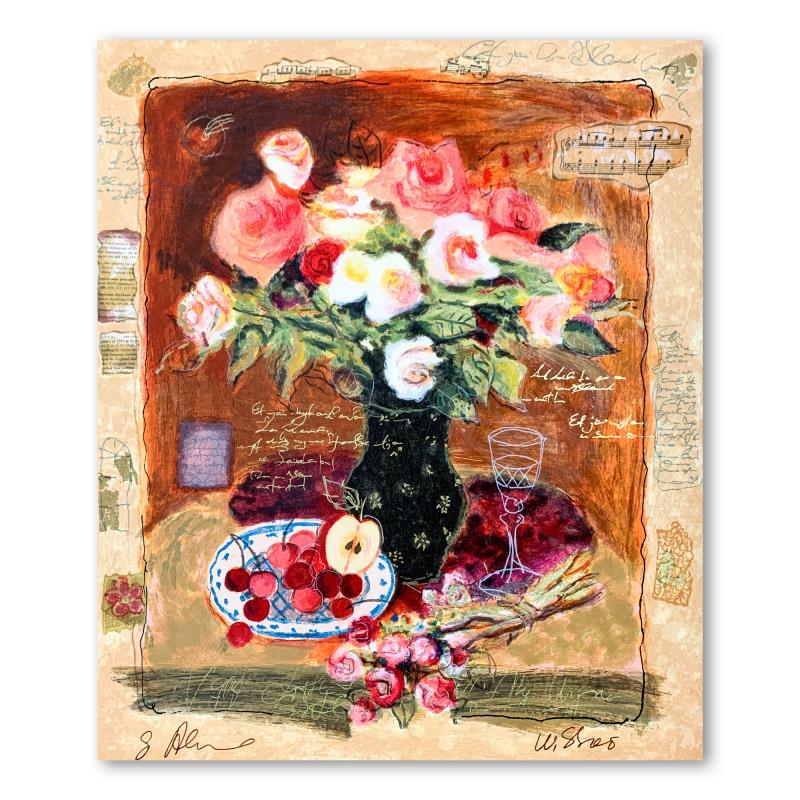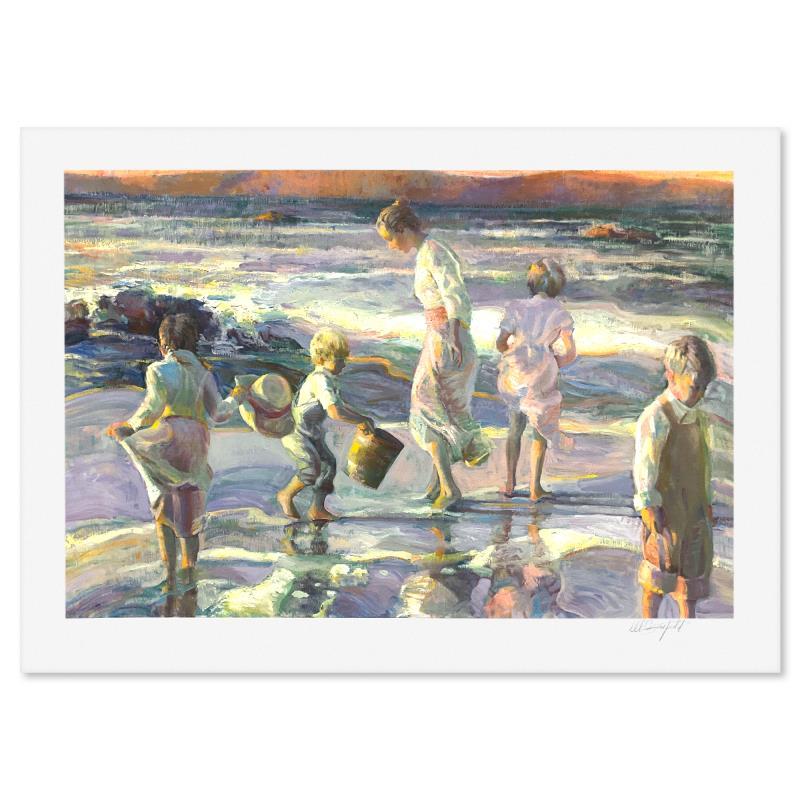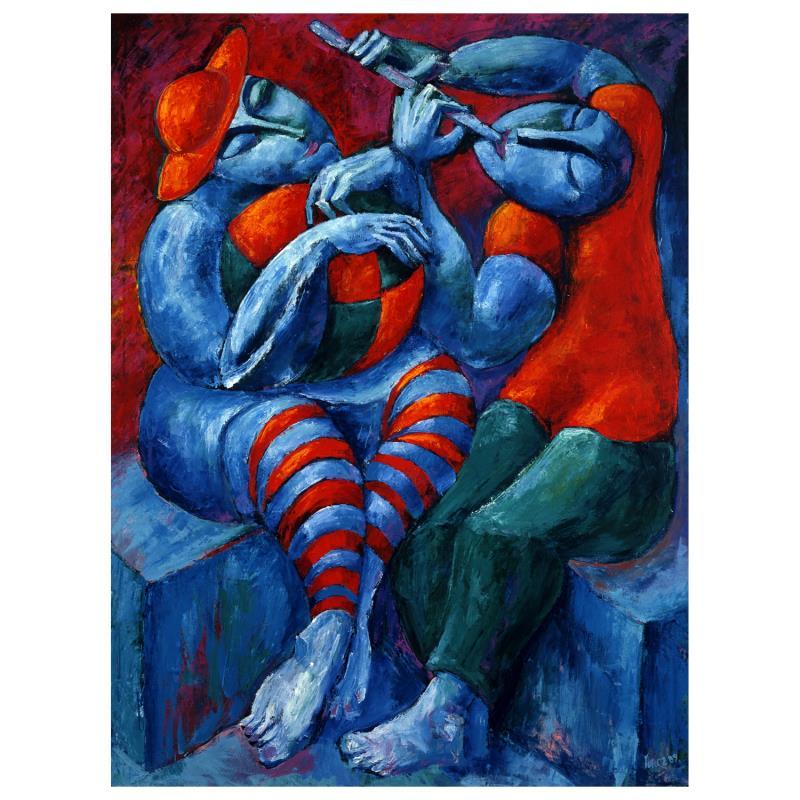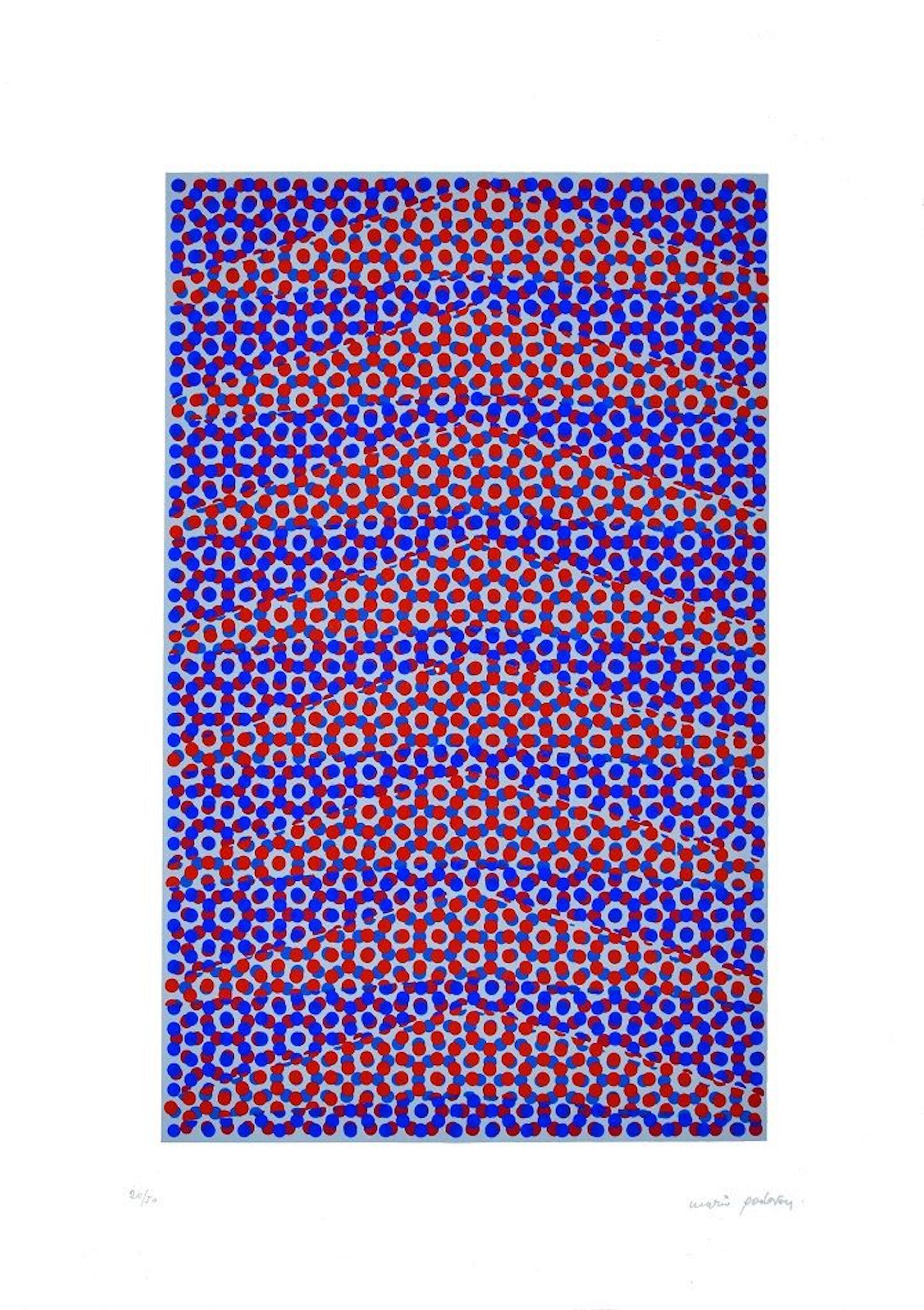Items Similar to Disconnected Circles - Original Screen Print by Mario Padovan - 1970s
Want more images or videos?
Request additional images or videos from the seller
1 of 5
Mario PadovanDisconnected Circles - Original Screen Print by Mario Padovan - 1970s1970s
1970s
About the Item
Disconnected Circles is an original colored serigraph realized by Mario Padovan in the 1970s.
Hand-signed in pencil on the lower right. Numbered in pencil on the lower left. Edition 16/50.
Good conditions.
Disconnected Circles belongs to the artist's portfolio of Op Art. In the late sixties and early seventies, indeed, Padovan focused on the research on Op Art, which he fundamentally interpreted as a way to break down an image.
The artworks regarding graphic screens, collages, and reflections for the break down of an object all belong to this period.
- Creator:Mario Padovan (1927, Italian)
- Creation Year:1970s
- Dimensions:Height: 27.56 in (70 cm)Width: 19.69 in (50 cm)Depth: 0.04 in (1 mm)
- Medium:
- Movement & Style:
- Period:
- Condition:Insurance may be requested by customers as additional service, contact us for more information.
- Gallery Location:Roma, IT
- Reference Number:Seller: M-1013781stDibs: LU65038447742
About the Seller
4.9
Platinum Seller
These expertly vetted sellers are 1stDibs' most experienced sellers and are rated highest by our customers.
1stDibs seller since 2017
6,693 sales on 1stDibs
Typical response time: 2 hours
- ShippingRetrieving quote...Ships From: Rome, Italy
- Return PolicyA return for this item may be initiated within 14 days of delivery.
Auctions on 1stDibs
Our timed auctions are an opportunity to bid on extraordinary design. We do not charge a Buyer's Premium and shipping is facilitated by 1stDibs and/or the seller. Plus, all auction purchases are covered by our comprehensive Buyer Protection. Learn More
More From This SellerView All
- Precious Reflections - Original Screen Print by Mario Padovan - 1970sBy Mario PadovanLocated in Roma, ITPrecious Reflections is a beautiful colored serigraph realized by Mario Padovan in the 1970s. Hand-signed in pencil on the lower right. Numbered in pencil on the lower left. Edition...Category
1970s Op Art More Prints
MaterialsScreen
- Complex Geometries - Screen Print by Mario Padovan - 1970sBy Mario PadovanLocated in Roma, ITComplex Geometries is an original colored serigraph realized by Mario Padovan in the 1970s. Hand-signed in pencil on the lower right. Numbered in pencil on the lower left. Edition o...Category
1970s Op Art More Prints
MaterialsScreen
- Complex Geometries - Original Screen Print by Mario Padovan - 1970sBy Mario PadovanLocated in Roma, ITComplex Geometries is an original colored serigraph realized by Mario Padovan in the 1970s. Hand-signed in pencil on the lower right. Numbered in pencil on the lower left. Edition o...Category
1970s Op Art More Prints
MaterialsScreen
- Hidden Flowers - Original Screen Print by Mario Padovan - 1970sBy Mario PadovanLocated in Roma, ITHidden Flowers is an original colored serigraph realized by Mario Padovan in the 1970s. Hand-signed in pencil on the lower right. Numbered in pencil on the lower left. Edition 20/50...Category
1970s Op Art More Prints
MaterialsScreen
- Optical Composition - Original Screen Print by Mario Padovan - 1973By Mario PadovanLocated in Roma, ITOptical Composition is an original colored serigraph realized by Mario Padovan in 1973. Hand-signed in pencil on the lower right. Numbered in pencil on the lower left. Edition 71/10...Category
1970s Op Art More Prints
MaterialsLithograph
- Abstract Totem - Original Lithograph by Mario Padovan - 1970sBy Mario PadovanLocated in Roma, ITAbstract Totem is an original colored lithograph realized by Mario Padovan in the 1970s. Hand-signed in pencil on the lower right. Numbered in pencil o...Category
1970s Op Art More Prints
MaterialsLithograph
You May Also Like
- "Exatopia", 1970, Silkscreen by Roy AhlgrenBy Roy AhlgrenLocated in Long Island City, NYArtist: Roy Ahlgren, American (1927 - 2011) Title: Exatopia Year: 1970 Medium: Silkscreen, signed, titled and numbered in pencil Edition: 49/150 Image Size: 17 x 16 inches Size: 20 ...Category
1970s Op Art More Prints
MaterialsScreen
- Agam Silkscreen Mod Judaica Lithograph Hand Signed Israeli Kinetic Op Art PrintBy Yaacov AgamLocated in Surfside, FLYaacov Agam Israeli (b. 1928) Hand signed, not individually numbered but from edition of 180. I can include a copy of the title sheet with the edition size and his signature if you r...Category
1980s Op Art Abstract Prints
MaterialsLithograph, Screen
- The Paris Review, signed and numbered 1960s Op Art geometric abstraction printBy Richard AnuszkiewiczLocated in New York, NYRichard Anuszkiewicz The Paris Review, 1965 Silkscreen on Beckett 90 lb. Hi-White paper with vellum finish 31 × 26 inches Edition 23/150 Signed lower left; dated and numbered lower r...Category
1960s Op Art Abstract Prints
MaterialsPencil, Screen
- Concatenation" OP Art Silkscreen by Roy AhlgrenBy Roy AhlgrenLocated in Long Island City, NYArtist: Roy Ahlgren, American (1927 - 2011) Title: Concatination Year: 1970 Medium: Silkscreen, signed, titled and numbered in pencil Edition: 150 Image Size: 18 x 18 inches Size: 2...Category
1970s Op Art More Prints
MaterialsScreen
- Agam Silkscreen Mod Judaica Lithograph Hand Signed Israeli Kinetic Op Art PrintBy Yaacov AgamLocated in Surfside, FLYaacov Agam Israeli (b. 1928) Hand signed, not individually numbered but from edition of 180. I can include a copy of the title sheet with the edition size and his signature if you request. sheet: 13.5 X 13.5 inches Some of these works have beautiful Hebrew calligraphy and mod imagery, animals, children and such that are not usually found in his work. This is a masterpiece of bold, graphic, mod design. Along with Reuven Rubin and Menashe Kadishman he is among Israel's best known artists internationally. Biographical info: The son of a rabbi, Yaacov Agam can trace his ancestry back six generations to the founder of the Chabad movement in Judaism. in 1946, he entered the Bezalel Academy of Arts and Design in Jerusalem. Studying with Mordecai Ardon, a former student at the Weimar Bauhaus. Yaakov Agam has been associated h with “abstract” artists, “hard edge” artists, and artists such as Josef Albers and Max Bill. Others find in Agam’s work an indebtedness to the masters of the Bauhaus. Agam’s approach to art, being conceptual in nature, has been likened to Marcel Duchamp’s, who expressed the need to put art “at the service of the spirit.” And, because of Agam’s employment of color and motion in his art, he has been compared to Alexander Calder, the artist who put sculpture into motion. (Motion is not an end, but a means for Agam. Calder’s mobiles are structures that are fixed, revolving at the whim of the wind. In a work by Agam, the viewer must intervene.) Agam has also been classified as an “op art” artist because he excels in playing with our visual sensitivities. Agam went to Zurich to study with Johannes Itten at the Kunstgewerbeschule. There, he met Frank Lloyd Wright and Siegfried Giedion, whose ideas on the element of time in art and architecture impressed him. In 1955, Galerie Denise René hosted a major group exhibition in connection with Vasarely's painting experiments with movement. in addition to art by Vasarely, it included works by Yaacov Agam, Pol Bury, Soto and Jean Tinguely, among others. Most Americans were first introduced to Vasarely by the groundbreaking exhibition, "The Responsive Eye," at New York's Museum of Modern Art in 1965. Josef Albers, Richard Anuszkiewicz. The show confirmed Vasarely's international reputation as the father of Op art. Agam has sought to express his ideas in a non-static form of art. In his abstract Kinetic works, which range from paintings and graphics to sculptural installations and building facades. Agam continually seeks to explore new possibilities in form and color and to involve the viewer in all aspects of the artistic process. Thus, for the past 40 years, Yaacov Agam’s pioneering ideas have impacted developments in art, (painting, monoprint, lithograph and agamograph) architecture, theatre, and public sculpture. Reflecting both his Israeli Jewish...Category
1980s Op Art Abstract Prints
MaterialsLithograph, Screen
- Agam Silkscreen Mod Judaica Lithograph Hand Signed Israeli Kinetic Op Art PrintBy Yaacov AgamLocated in Surfside, FLYaacov Agam Israeli (b. 1928) Hand signed, not individually numbered but from edition of 180. I can include a copy of the title sheet with the edition size and his signature if you request. sheet: 13.5 X 13.5 inches Some of these works have beautiful Hebrew calligraphy and mod imagery, animals, children and such that are not usually found in his work. This is a masterpiece of bold, graphic, mod design. Along with Reuven Rubin and Menashe Kadishman he is among Israel's best known artists internationally. Biographical info: The son of a rabbi, Yaacov Agam can trace his ancestry back six generations to the founder of the Chabad movement in Judaism. in 1946, he entered the Bezalel Academy of Arts and Design in Jerusalem. Studying with Mordecai Ardon, a former student at the Weimar Bauhaus. Yaakov Agam has been associated h with “abstract” artists, “hard edge” artists, and artists such as Josef Albers and Max Bill. Others find in Agam’s work an indebtedness to the masters of the Bauhaus. Agam’s approach to art, being conceptual in nature, has been likened to Marcel Duchamp’s, who expressed the need to put art “at the service of the spirit.” And, because of Agam’s employment of color and motion in his art, he has been compared to Alexander Calder, the artist who put sculpture into motion. (Motion is not an end, but a means for Agam. Calder’s mobiles are structures that are fixed, revolving at the whim of the wind. In a work by Agam, the viewer must intervene.) Agam has also been classified as an “op art” artist because he excels in playing with our visual sensitivities. Agam went to Zurich to study with Johannes Itten at the Kunstgewerbeschule. There, he met Frank Lloyd Wright and Siegfried Giedion, whose ideas on the element of time in art and architecture impressed him. In 1955, Galerie Denise René hosted a major group exhibition in connection with Vasarely's painting experiments with movement. in addition to art by Vasarely, it included works by Yaacov Agam, Pol Bury, Soto and Jean Tinguely, among others. Most Americans were first introduced to Vasarely by the groundbreaking exhibition, "The Responsive Eye," at New York's Museum of Modern Art in 1965. Josef Albers, Richard Anuszkiewicz. The show confirmed Vasarely's international reputation as the father of Op art. Agam has sought to express his ideas in a non-static form of art. In his abstract Kinetic works, which range from paintings and graphics to sculptural installations and building facades. Agam continually seeks to explore new possibilities in form and color and to involve the viewer in all aspects of the artistic process. Thus, for the past 40 years, Yaacov Agam’s pioneering ideas have impacted developments in art, (painting, monoprint, lithograph and agamograph) architecture, theatre, and public sculpture. Reflecting both his Israeli Jewish...Category
1980s Op Art Abstract Prints
MaterialsLithograph, Screen
Recently Viewed
View AllMore Ways To Browse
Vintage Fox Hunt Print
Vintage Posters Montreal
Andy Warhol Chicken
Mont Blanc Retro Poster
Vintage Cat Tapestry
Vintage Superhero Posters
London Transport Museum Vintage Posters
Bullfight Poster
Original Vintage Italy Poster Naples
Retro Florida Travel Poster
Retro Electricity Poster
Poster Vintage Jerusalem
Shepard Fairey Lotus
Vintage Record Planes
Contemporary Mexican Piggy Bank
Edinburgh Vintage Travel Poster
Vintage Driving Hats
Vintage Hong Kong Airline
